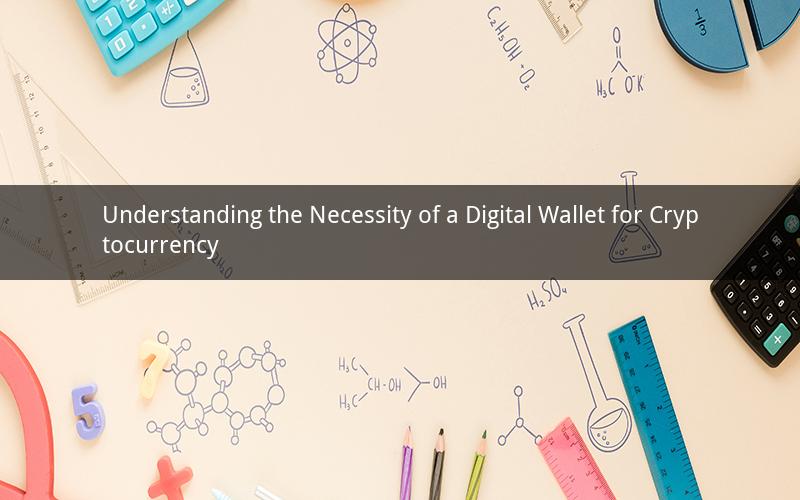
Introduction:
In the rapidly evolving world of cryptocurrencies, the concept of a digital wallet has become increasingly important. As more individuals and businesses embrace digital currencies, the question of whether a digital wallet is necessary for managing and storing cryptocurrencies arises. This article delves into the significance of a digital wallet for crypto, its benefits, and the factors to consider when choosing one.
1. What is a Digital Wallet?
A digital wallet is a software application or device that allows users to store, send, and receive cryptocurrencies. It serves as a virtual equivalent of a physical wallet, providing a secure and convenient way to manage digital assets. Digital wallets can be categorized into three types: hot wallets, cold wallets, and hybrid wallets.
2. Why Do You Need a Digital Wallet for Crypto?
a. Security: One of the primary reasons to use a digital wallet is to ensure the security of your cryptocurrencies. Unlike traditional banks, digital wallets offer enhanced security measures such as encryption, private keys, and multi-factor authentication. This helps protect your assets from unauthorized access and theft.
b. Accessibility: Digital wallets provide easy access to your cryptocurrencies, allowing you to make transactions, check balances, and monitor your assets anytime, anywhere. This convenience is particularly beneficial for individuals who engage in frequent trading or require quick access to their funds.
c. Control: With a digital wallet, you have complete control over your cryptocurrencies. Unlike centralized exchanges, where your assets are held by a third-party, a digital wallet enables you to manage your funds independently. This control is crucial for protecting your assets from potential exchange hacks or shutdowns.
d. Privacy: Digital wallets offer a higher level of privacy compared to traditional banking systems. Users can transact in a pseudonymous manner, making it difficult for third parties to track their activities. This privacy is especially important for individuals who value their financial privacy and wish to avoid sharing sensitive information with third parties.
3. Types of Digital Wallets
a. Hot Wallets: Hot wallets are online digital wallets that are connected to the internet. They offer convenience and ease of use but are more susceptible to hacking and theft. Examples include mobile wallets, web wallets, and desktop wallets.
b. Cold Wallets: Cold wallets are offline digital wallets that store cryptocurrencies in a physical form. They provide enhanced security but are less convenient to use. Examples include hardware wallets, paper wallets, and USB wallets.
c. Hybrid Wallets: Hybrid wallets combine the features of both hot and cold wallets. They offer a balance between security and convenience. Examples include mobile wallets with a built-in cold storage feature.
4. Factors to Consider When Choosing a Digital Wallet
a. Security: Ensure that the digital wallet you choose offers robust security features, such as encryption, private keys, and multi-factor authentication. Look for wallets that have a good track record of security and are regularly updated to address vulnerabilities.
b. User-Friendly Interface: Choose a digital wallet with an intuitive and user-friendly interface. This will make it easier for you to manage your cryptocurrencies and perform transactions without any confusion.
c. Compatibility: Ensure that the digital wallet supports the cryptocurrencies you intend to store and trade. Some wallets may support a limited number of cryptocurrencies, while others offer a broader range.
d. Transaction Fees: Consider the transaction fees associated with the digital wallet. Some wallets may charge higher fees for faster transactions, while others offer lower fees but slower processing times.
5. Frequently Asked Questions (FAQs)
Q1: Can I use a regular email account to create a digital wallet?
A1: Yes, you can use a regular email account to create a digital wallet. However, it is important to choose a strong and unique password to ensure the security of your wallet.
Q2: Can I use the same digital wallet for all cryptocurrencies?
A2: Some digital wallets support multiple cryptocurrencies, while others are designed for specific cryptocurrencies. It is advisable to choose a wallet that supports the cryptocurrencies you intend to use.
Q3: Are digital wallets safe from hacking?
A3: Digital wallets can be vulnerable to hacking, especially hot wallets that are connected to the internet. However, by following best practices such as using strong passwords, enabling multi-factor authentication, and keeping your wallet software updated, you can minimize the risk of hacking.
Q4: Can I recover my lost cryptocurrencies if I lose my digital wallet?
A4: If you lose your digital wallet, you may lose access to your cryptocurrencies. However, if you have backups of your private keys or recovery phrases, you can regain access to your assets by restoring them to a new wallet.
Q5: Can I use a digital wallet for both personal and business purposes?
A5: Yes, you can use a digital wallet for both personal and business purposes. However, it is advisable to keep your personal and business assets separate to maintain better control and security over your funds.
Conclusion:
In conclusion, a digital wallet is an essential tool for managing and storing cryptocurrencies. It offers enhanced security, accessibility, control, and privacy. By understanding the different types of digital wallets and considering the factors mentioned above, you can choose the right wallet that suits your needs. Remember to prioritize security and privacy when selecting a digital wallet to ensure the safety of your cryptocurrencies.